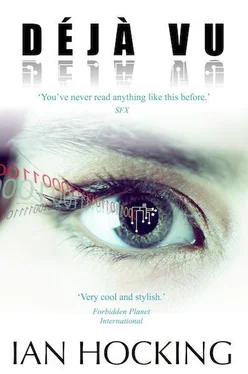Tolsdorf hurried to the door, opened it, and stepped onto his porch. What he saw and felt returned him to the morning his family died: the smell of paints, plastics and clothes on fire; the neighbours preventing his re-entry to the house; the certain conviction that his wife and his boys, the twins, were dying in each other’s arms in a wardrobe; and Tolsdorf, raging, shouting calls that remained unanswered.
Here, on the far side of the valley, a mushroom-cap cloud was turning about a yellow core, hundreds of metres high and climbing. A speck of ash fell on Tolsdorf’s tongue. His wonder grew with every gust of crisp bark and blasting air. He looked at the back of his hands. They were bald. The heat reached his eyes, dried them, and he backed against the hut. He put his knuckles to his nose. The hair was gone: burned.
~
He put the pistol on the table and pulled out the first-aid kit that he had never used. Then, feeling the charge of a life not yet spent, Tolsdorf took a blanket from his bed and left the hut. He was not responding to the mirror, he decided. He was investigating the explosion. He crossed the short dooryard and dunked the blanket in the river. Its sudden weight pulled him forward and he stumbled into the water. The cold found his feet through the eyelets of his boots. Old age was making him a clown. All the while, he felt the singeing of his eyebrows and the growing heat on his cheeks. Then he pulled the blanket about himself. It was cool—like night, his best and clearest time. He pulled down the peak of his cap and crossed the river in large strides that recalled the tall man he had once been.
There was a deer path that coiled around the western shoulder of the hill. Tolsdorf set himself upon it. His legs were pained with cramp and his knees clicked, but he walked this path every morning to claim the vantage of the hill, and with the familiarity came ease. His breath quickened. In the shelter here, the heat slackened and his mind calmed. That much fuel, in so isolated a location, could only mean that a plane had crashed. A large one. Tolsdorf shook out his bandana and covered his nose and mouth. Ash and wood cinders were falling through the forest canopy. Larger pieces—he saw a sheet of paper with a letterhead, a deformed plastic cup—pattered on the trees like fat drops of summer rain. And the smell rolled over him: a bloody stink of incineration.
He reached the top of the hill. Through streaming eyes, he saw that the forest had been wiped away. A foggy bowl of dirt remained. There was an ordinariness about the thin layer of debris. It might have been a steaming rubbish dump. Tolsdorf struggled to understand. How could this have been an aircraft? What could have happened to the mass of it? He could see part of one engine. On the far lip of the depression, almost one-hundred metres distant, was a tyre, still inflated. It was certainly an aircraft tyre. Nearer, he saw a paperback novel. He surprised himself by recognising the cream-and-blue cover. Captain Corelli’s Mandolin . Frau Waellnitz had wanted to read it to him months ago but Tolsdorf had dismissed the idea with a grunt, playing fully on her expectations of this backward woodsman. Then, as though the paperback unlocked his perception, he saw the scattered, broken pieces of people. His eyes faltered in the toxic air and the heat. He squeezed them shut and knelt fully, coughing.
Not so old to be useless, Tolsdorf. Move.
‘On three,’ he growled. ‘Three.’
He rose, settled the blanket around his shoulders, and walked into the debris. The surface was hot through his boots but the fires had shrunk to flickering islands. Now the ash fell upwards as well as down. He picked a route that took him from one ruined stump of tree to another, and he sometimes crouched, gasping, waiting for the next roll of smoke to pass, praying he would not collapse. His eyes felt ruined. He wanted to be sick but his retches produced only spit. He did not know what to do. There was no-one alive here. Beneath his boots were plastic cups, seat cushions, wiring, and things he would not name.
He focused on the mechanics of the crash. What would it take for someone to survive this?
It happens. Sometimes it happens.
Ten metres away, beyond an upturned tree, was a long sheet of fuselage. It was sooty and mangled but its windows were intact. For someone to survive, Tolsdorf thought, they would need the protection of a strong structure. They would need a space. Tolsdorf hauled himself towards it. He stepped on one of the windows and scraped away the soot with his heel. It revealed something bright beneath the shed skin of the aircraft. Tolsdorf dropped his first-aid kit and blanket. The renewed heat assaulted his body but, with the last of the fires going out, he felt he could work. His head was clearer. He took wood-chopping gloves from the long pockets of his trousers—they had Kevlar pads, what he needed—and thought about the best way to lever up the fuselage. Then he crouched by the edge that looked thinnest, said, ‘On three,’ and felt his muscles gorge on the sorry old blood. The metal began to lift.
To continue, buy the book from the UK Kindle store or the US

Photograph by Mimika Cooney
During his fifteen-year writing career, Ian Hocking’s fiction has been published extensively, both online and in print. He graduated with a degree in experimental psychology from the University of Exeter and now lectures in psycholinguistics, philosophy and research methods at Canterbury Christ Church University and the Open University.
‘A new voice in Brit SF that we should all be taking an interest in.’
Joe Gordon, Forbidden Planet International
‘Larger publishers take note.’
The Guardian
‘Handled with casual panache. It’s gripping, fascinating, and powerful, and really well written, with wonderful pace.’
Ian Watson, screenwriter ‘Artificial Intelligence: AI’
‘You’ve never read anything like this before.’
SFX
‘A crisply-written, fast-paced thriller that makes assured use of cutting-edge science fiction ideas.’
Ken MacLeod
‘[Hocking’s] layering of the narrative is thoughtful and the way he makes events from different decades mirror each other shows quiet skill. This is a small-press publication; as such, it probably won’t get the exposure it deserves. Larger publishers may want to take note.’
The Guardian
‘A multi-threaded, thought-provoking sci-fi thriller. It is always a nice surprise to see a debut novel such as Déjà Vu . Thoroughly recommended.’
SciFi.uk.com
‘Excellent… crisp and professional. This book bodes well for the future.’
Grumpy Old Bookman
‘Get ready to have a mind-blowing experience.’
POD Girl
In the Saskia Brandt Series
Flashback (Book 2)
The Amber Rooms (Book 3)
Comedy
Proper Job: A Romantic Comedy
Literary Short Fiction
A Moment in Berlin and Other Stories
Copyright © 2011 by Ian Hocking
http://ianhocking.com
http://twitter.com/ian_hocking
This story is a work of fiction. Names, characters, places, and incidents are either products of the author’s imagination or used fictitiously. Any resemblance to actual events, locales, or persons, living or dead, is entirely coincidental.
Читать дальше













